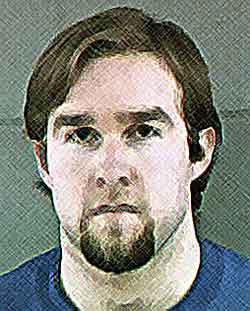Judging by preliminary findings, says the head of a panel of experts reviewing the Capitol Hill massacre of six teenagers and young adults, they’ll likely be able to answer that most nagging of questions, “Why?” when the panel completes a review in May or June. Boston criminologist James Alan (Jimmy) Fox says he has his four-member team together, has begun interviews and research, and is “very optimistic we can make some sense of what seems so unfathomable” about the March 25 shootings by enigmatic killer Kyle Huff, 26, an aimless, bear-sized Montana man with a truck full of weapons who saved his last shot for himself.
Fox, a Northeastern University professor, author of 16 books, and considered an expert on mass murder, says there are many typical patterns to such a killer’s background—isolation, rejection, shiftlessness, a deferentially polite manner that helped mask an inner rage. But what the panel hopes to do is pinpoint exactly when and why Huff began his slow psychological descent to homicide. Fox is already sure Huff didn’t have a sudden break, that in the midst of the party at the blue house on East Republican Street that night and morning, there was not a lone cause or incident behind the violent eruption.
“He didn’t snap,” Fox says. “People don’t snap—that’s just generally not the case, that someone suddenly went berserk.” In Huff’s final moments, he quietly left the home around 7 a.m., went to his truck, and armed himself with several weapons, including a shotgun. He took the time to spray paint a perhaps symbolic expression of his feelings —the word “Now”—on the sidewalk before returning to randomly open fire on residents and guests. In addition to the six who died, two were wounded; confronted by a police officer, whose quick arrival likely prevented further murders, Huff then shot himself in the head.
“There are reasons for what these people do,” says Fox. “It is not senseless—not in the manner that there is no meaning to it, no explanation. I think we can demonstrate that.” He didn’t want to discuss precise details of what he and the others have learned, nor name his associates yet, other than to say they are experienced in criminology, psychiatry, and community-impact issues. “I really can’t go into what we’ve found out until we’re done. Things can change. We’ve spent a good number of days talking to witnesses and other people, and we’re making progress.” The timing of a final report will “depend on how quickly we get all the answers we need.”
Seattle Police spokesperson Debra Brown says the department has “nothing new” to release on the murder investigation. Neither SPD, the King County Medical Examiner, nor the Washington State Patrol crime lab would reveal results of a toxicology exam of Huff’s body, which was autopsied and released to a local funeral home before being shipped to Montana for a private funeral. So far, according to witnesses, Huff is known only to have smoked a small amount of marijuana and drunk a beer or two prior to the killing spree. Fox says he hasn’t seen the tox report but is eager to do so. “It may help us understand,” he says. “We want to know what factors may have motivated him, what issues were on his mind—was there a rhyme or reason, a purpose to choosing that time, that location. The more we know, the better.”
Fox was brought aboard by Seattle Police Chief Gil Kerlikowske shortly after the shootings. The intent is to help survivors, relatives, and the city at large comprehend what might have driven Huff to kill. “That was quite unusual to do that,” to form the panel, Fox says. “I’ve been involved in a lot of these cases, and it usually means examining evidence and so on in cases that are not solved, or are in litigation. In this instance, we know who did it.” Still, he adds, “Even though this case is technically closed, it’s not solved. Not until we know why.”









